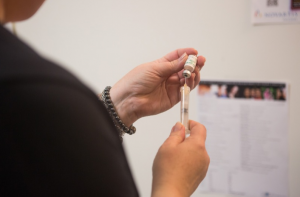Provided by the Pennsylvania Department of Health:
The Department of Health, in partnership with the departments of Education and Insurance, recently continued the “Don’t Wait. Vaccinate.” campaign by hosting an immunization clinic and encouraging parents to add immunization updates to the list of things children need before their first day of school.
“Vaccines are among the safest and most cost-effective ways to prevent disease,” said Secretary of Health Dr. Karen Murphy. “Childhood vaccines protect against 14 serious and potentially life-threatening diseases. When children are not vaccinated, they are at increased risk for diseases that they can also spread to others. As you prepare to send your children back-to-school, we urge you to make getting them vaccinated a priority on your to-do list. Keeping their vaccinations current will help keep your children in class and help us create healthy schools that teach. Protect your children by contacting your health care provider or state health center today to schedule an appointment.”
“In order to learn effectively, students need to be engaged, and to be engaged they must first be healthy and safe,” said Secretary of Education Pedro Rivera. “Families of students entering or returning to school this year should protect the health of their loved ones by properly vaccinating them against serious illnesses that could cause absences or disruptions to learning. Immunization clinics like the ones offered by the “Don’t Wait. Vaccinate.” campaign ensure that all families, regardless of location or income, can have access to preventative medicine.”
Children in grades K-12 need the following immunizations for attendance: tetanus, diphtheria, polio, MMR (measles, mumps, rubella), hepatitis B, and chickenpox. Children entering the seventh grade also need additional immunizations of meningococcal conjugate vaccine (MCV) and tetanus, diphtheria, acellular pertussis (Tdap).
All of the vaccines listed above are available at back-to-school clinics the Department of Health is holding statewide until September 2. The clinics will provide immunizations at little or no cost for children through 18 years of age who are Medicaid eligible, uninsured, underinsured, or American Indian or Alaska Native. The cost is $5 per child (payable by check or money order) for families above income guidelines, although no child will be turned away because of an inability to pay.
Parents whose children meet the requirements for the vaccine clinics must call 1-877-PA-HEALTH (1-877-724-3258) to schedule an appointment. Parents should have their vaccination records available when they call to make an appointment. A parent/legal guardian must accompany the child receiving immunizations. Department of Health staff will need to be notified prior to the appointment if someone other than the child’s parent/legal guardian will be accompanying him/her. To help those who are unable to visit during regular working hours, evening and weekend hours are available at certain locations.
In addition to these special back-to-school vaccine clinics, the Department of Health regularly schedules immunization clinics throughout the year across the commonwealth. Interested individuals can call 1-877-PA-HEALTH (1-877-724-3258) or visit www.dontwaitvaccinate.pa.gov to get more information.
Insurance Commissioner Teresa Miller noted that under the Affordable Care Act, most insurance plans, including those bought through the federal Marketplace, are required to cover school vaccinations as a free preventive service without charging a copayment or coinsurance, regardless of whether or not you have met your yearly deductible.
“When a new school year starts, there are many costs parents have to consider with textbooks, school supplies, and other expenses,” Commissioner Miller said. “Thankfully, immunizations aren’t one of them, as most insurance plans cover school vaccinations with no cost to the consumer.”
It is important to make sure that the doctor or provider who administers the immunization is within your health insurance plan’s network, or you may be responsible for the cost. More information on preventive services is available at HealthCare.gov.









